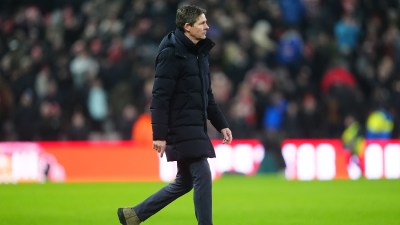Whatmore do they need?
Dav Whatmore is pragmatic enough to know that you cannot beat monsoon conditions, whether they are in Dhaka or Colombo. The former Sri Lanka...

Dav Whatmore is pragmatic enough to know that you cannot beat monsoon conditions, whether they are in Dhaka or Colombo. The former Sri Lanka coach has had enough experience from the time he resumed his links with the emerald isles in August 1999 to know what to expect.
With a thicker rug than normal adorning his upper lip, he is back in Colombo with international lightweights Bangladesh for the Asia Cup tournament starting on Thursday, and cheerfully explains that at this time of year there is an ongoing of risk of rain. Some days are better than others; it is a bonus when a team can get in a full practice match and batsmen a chance to feel the conditions.
Mohammad Ahsraful, a veteran at only 19 yet still growing as a batsman, put together an elegant century against a side drawn from the left overs of the Sri Lankan A side and gave glimpses of his exciting talent. It is almost three years since he became the youngest Test batsman to score a century, in an Asia Test Championship match at the Sinhalese Sports Club, and this latest three-figure score suggests he has found form early, an encouraging sign for Bangladesh on the eve of the tournament.
Whatmore had seen that Test debut Ashraful century from the Sri Lanka balcony and noted his energetic style and strokeplay, often hindered by a lack of attention to basics and an indiscipline that so often undoes many inexperienced players8217; performances. The Sri Lanka-born, former Australian all-rounder who still has his home in Colombo was cautious in his praise of Ashraful.
He quietly confides that 8216;8216;Bangladesh is a side that plays as a unit8217;8217;, then thinks deeply for a moment. 8216;8216;Though I have instilled in them a positive attitude, and it is starting to show, I have to be very realistic and explain that there are some very strong batting sides around. All you need to do is look at the Indians, no longer do they rely just on Sachin; they have a fine battery with Ganguly, Dravid, Laxman, Sehwag, and Yuvraj.
8216;8216;I also learnt long ago that at this level you don8217;t look for miracles to win games. What we should be doing, though, is to look well beyond current expectations. This is a young side, still inexperienced. So I8217;m not expecting miracles.
What is needed instead, Whatmore continues, is to create a winning culture to turn it around 8212; and it is not, he concedes, an overnight thing. 8216;8216;What I am doing is creating a climate of mental toughness; give them ideas and encouragement. It is up to them to do the rest.8217;8217;
When Whatmore took over as Sri Lanka coach before the 1995/96 season that led to the World Cup success, the squad was already established with a pool of experienced and hardened players. The Australia pre-World Cup tour and the treatment of Muttiah Muralitharan had added to their determination to tackle the Aussies head on and not stand back.
Another factor was that Aravinda de Silva was at the peak of his career as a batsman and Arjuna Ranatunga had developed as a captain with insight in planning strategies. As such, it was easy to create a team with a competitive attitude and it was around the De Silva/Ranatunga duo that the World Cup formula and team slotted into place.
Bangladesh are well short of such expertise and need time to develop an international playing culture, as did Sri Lanka and Zimbabwe. He hopes that after a year as their coach, much of what he has taught them will eventually start to emerge in their style of play and approach to the game and that from this, they will become more confident and competitive.
About the only discordant blip on the Whatmore confidence screen is how he was forced out of the Sri Lanka team. It was argued among those in charge of Sri Lanka Cricket after CWC03 that he had 8216;8216;run out of ideas8217;8217; and this was spread as a rumour in the Sri Lanka media that he no longer wanted to be part of the team and already had his eye on the Bangladesh job.
Whatmore8217;s version is slightly different: SLC administrators and some of the players he doesn8217;t mention names didn8217;t want him. SLC secretary and now chairman Mohan de Silva even told a TV channel that his style of coaching had become 8216;8216;tired and defective8217;8217; and the reason why his contract was not renewed.
Typical of team sports culture, though, that while captains grab all the bouquets when they are winning trophies and performing well, the brickbats are hurled only at the coach when it comes to defeat.
- 01
- 02
- 03
- 04
- 05






























